How to Bypass The Great Firewall of China Without VPN [Easy]
9 min. read
Updated on
Read our disclosure page to find out how can you help VPNCentral sustain the editorial team Read more
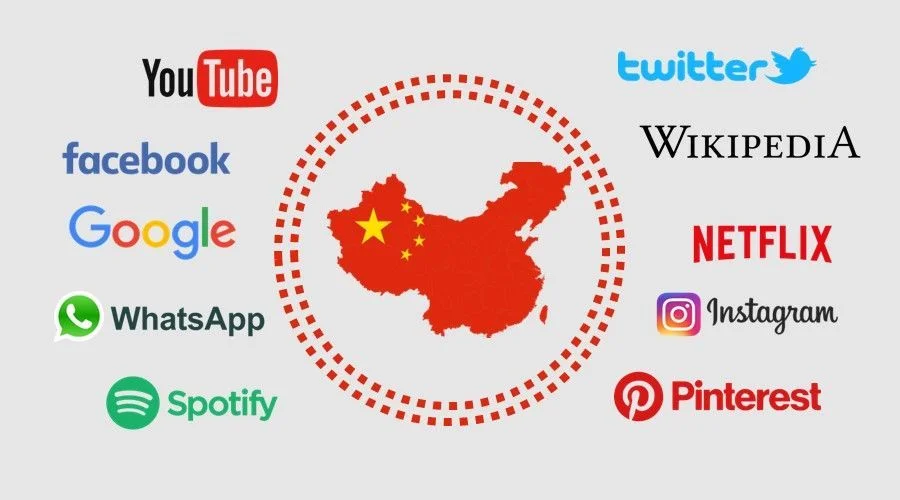
China has one of the most notorious internet filtering programs globally. It blocks 8,000+ popular websites from being accessible in the country.
Why?
The Chinese government claims it enforces censorship to protect society. Accordingly, it employs the Great Firewall of China to accomplish this.
And this can be a nuisance if you find yourself in the country. While you can use a VPN, it’s somewhat risky.
However, there are safer alternatives available. Curious to know which ones and how they work?
Read on to discover the best ways to bypass the China Firewall without a VPN.
What is the Great Firewall of China and how does it work?
The Great Firewall of China, formally known as the Golden Shield Project, is a combination of legislative actions and technologies enforced by the People’s Republic of China to regulate the internet domestically.
Its goal is to block access to selected foreign websites and to slow down cross-border internet traffic.
The Great Firewall focuses on blocking or censoring information that is deemed harmful to the Chinese government’s objectives, including political dissent, western cultural influences, or news that portrays the government unfavorably.
The system relies on a combination of sophisticated technologies to make this possible.
Here’s the breakdown:
- ISP filtering: China requires internet service providers (ISPs) to restrict customers from accessing certain content. This is also known as IPS blocking, which enhances the effectiveness of the GFW.
- URL/Hostname filtering: It involves blocking hostnames for target platforms on the internet. Examples include Facebook.com, Google.com, Twitter.com, and more. That way, anyone attempting to access the sites receives a restriction alert.
- IP blocking: Web apps rely on multiple IP configurations to increase service availability. Accordingly, China’s internet firewall tracks and clamps down the IPs of targets.
- DNS filtering: The domain name system (DNS) enables users to locate resources on the web. It does this by translating IP addresses into memorable URLs/hostnames. As such, the GFW blocks DNS requests to platforms deemed harmful in China.
- Deep packet filtering (DPI): This technique closely inspects data sent over a network. It enables China to discover users trying to circumvent its firewall. Additionally, it blocks the use of VPNs that citizens use to bypass censorship.
China also enforces strict laws to discourage people from evading the GFW. If caught, you stand to face fines, jail time, and restrictions from using the internet.
But people still do it anyway and hardly get caught. And get this – without using a VPN.
Still wondering how? Wait no more!
How to bypass China’s Great Firewall without a VPN?
China’s GFW can spoil the fun if you’re in the country or visiting. However, use any of these methods to access the web from there freely:
Tor
The Onion Router (Tor) is an open-source privacy project that anonymizes web browsing. It spoofs user IP addresses by redirecting traffic through untraceable network nodes.
The US Navy developed the technology in the 1990s to protect sensitive communications. Nowadays, it helps journalists, whistleblowers, and other users safeguard their privacy online.
Tor is pretty easy to use. All you need is a compatible browser and you’ll be good to go.
Here’s how it works:
- Download and install the Tor browser or Brave.
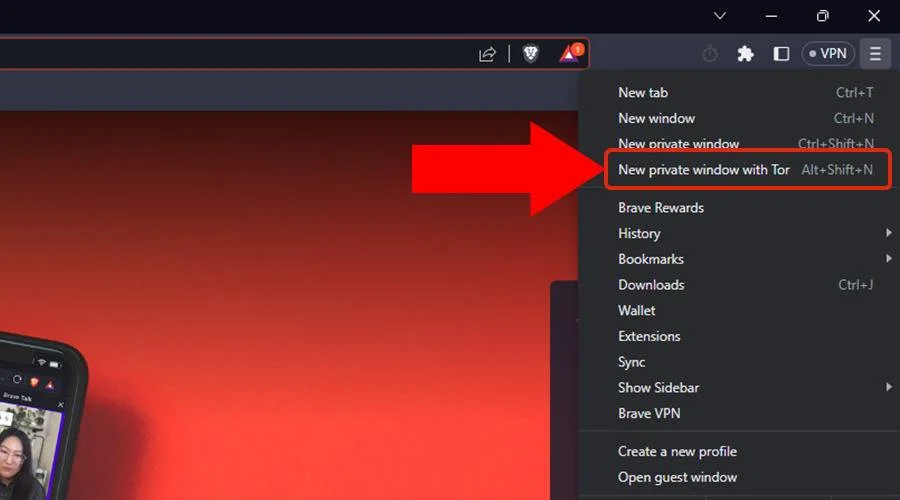
2. Launch the Tor tab and click Connect.
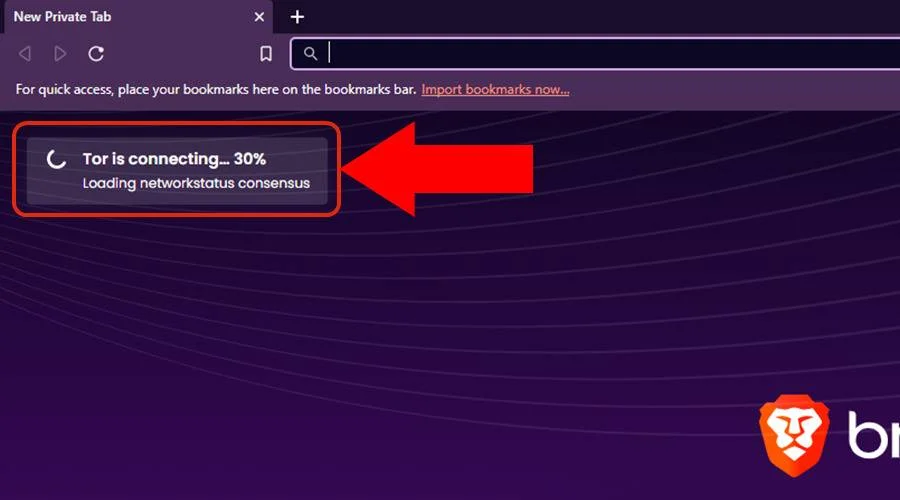
3. Wait for a connection to the Tor network.
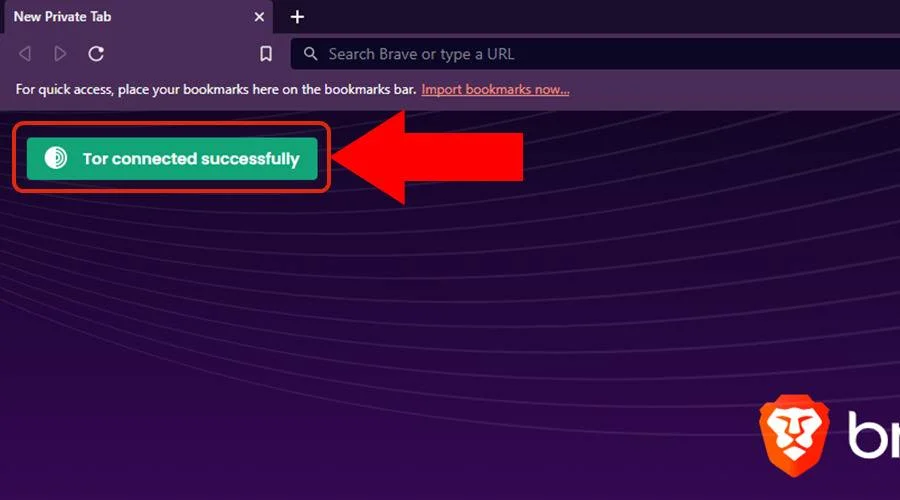
4. Enjoy accessing blocked websites in China.
The beauty of Tor is it replaces servers/nodes regularly to prevent GFW blocking. However, browsing using its network is fairly slow.
This is due to its sophisticated encryption. As such, you’ll appreciate high-level anonymity when using the service in China.
But how about using a VPN that’s not really a VPN? Enter the world of…
Psiphon
Psiphon is a VPN-like service designed to bypass geo-blocking and internet censorship. It has a network of constantly changing servers to maximize user privacy.
The application offers a novice-friendly user interface. You also get the privilege to set preferred locations like in VPNs.
Psiphon is open-source and regularly audited by volunteer cybersecurity experts. This ensures the circumvention tool remains secure at all times.
Follow these simple steps to set it up:
- Download and install Psiphon on your device of choice.
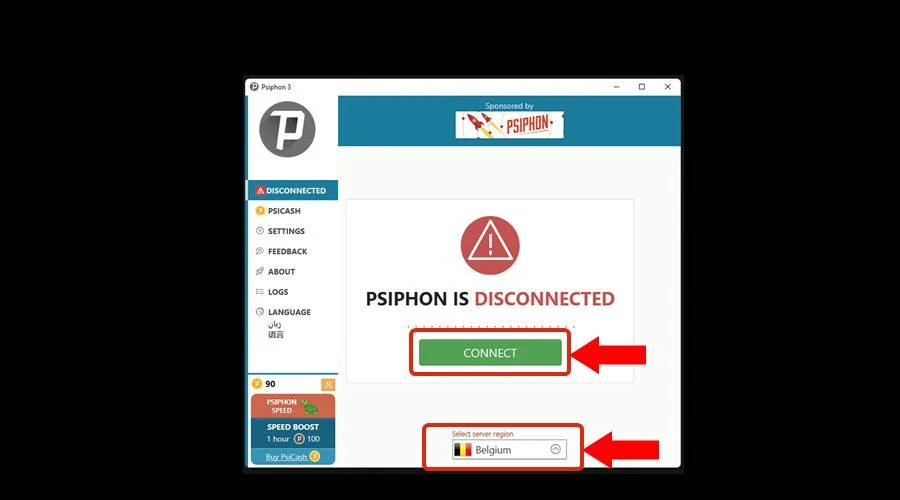
2. Run the application and pick an ideal server location.
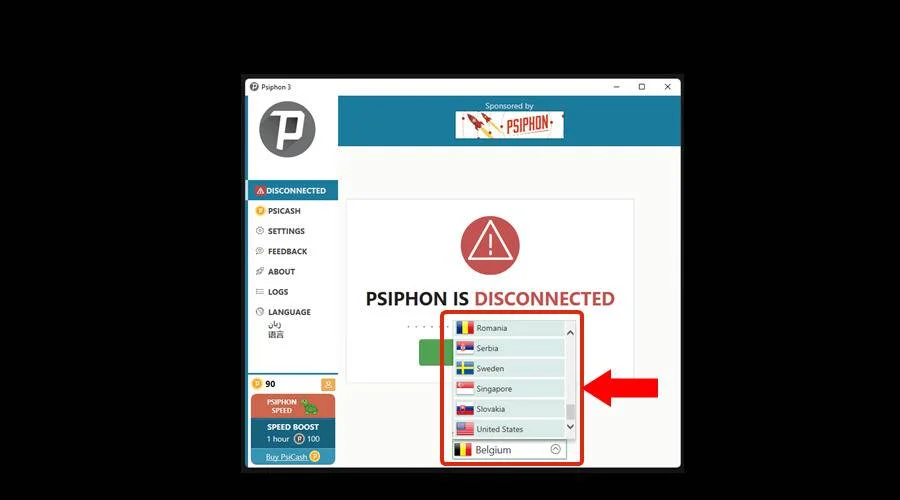
3. Click Connect to bypass circumvention.
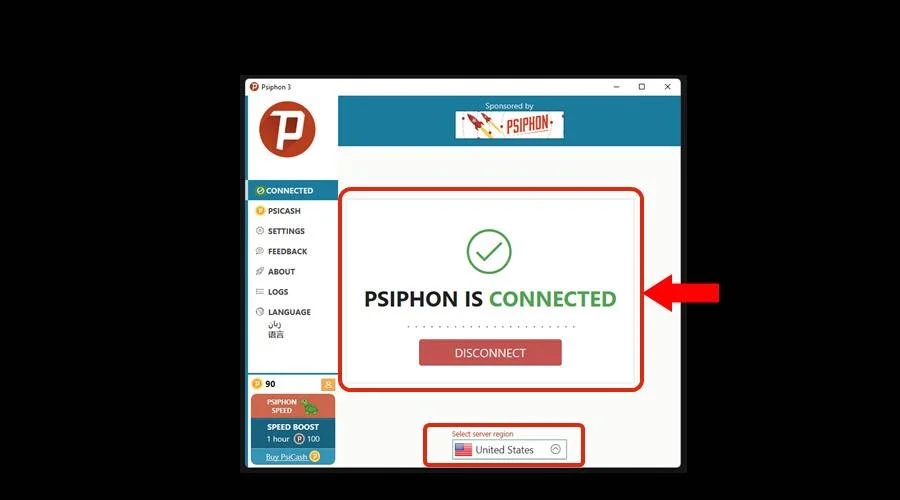
4. Confidently browse all blocked websites in China.
Psiphon limits speeds to around 2Mbps for free users. That’s decent for internet browsing and moderate streaming.
You can choose to upgrade if you’re into data-hungry tasks. The plans are affordable thanks to flexible pricing.
Proxy server
A proxy server is another alternative for evading the Great Firewall of China. It acts as an intermediary that handles internet requests on your behalf.
This solution also hides your IP to protect your privacy. But you’ve to be careful since most don’t encrypt traffic.
What does that mean for you?
GFW’s deep packet inspection can detect and block sites you’re visiting. Moreover, you risk ending up on the wrong side of China’s censorship laws.
On the bright side, Smartproxy is here to help. It uses robust, secure protocols such as HTTPS and SOCKS5.
The vendor also offers over 40 million proxy IPs across 195+ locations worldwide. Simply put, it makes it pretty hard for China’s Firewall to keep up.
Follow these steps to use it:
- Sign up for any plan on Smartproxy.
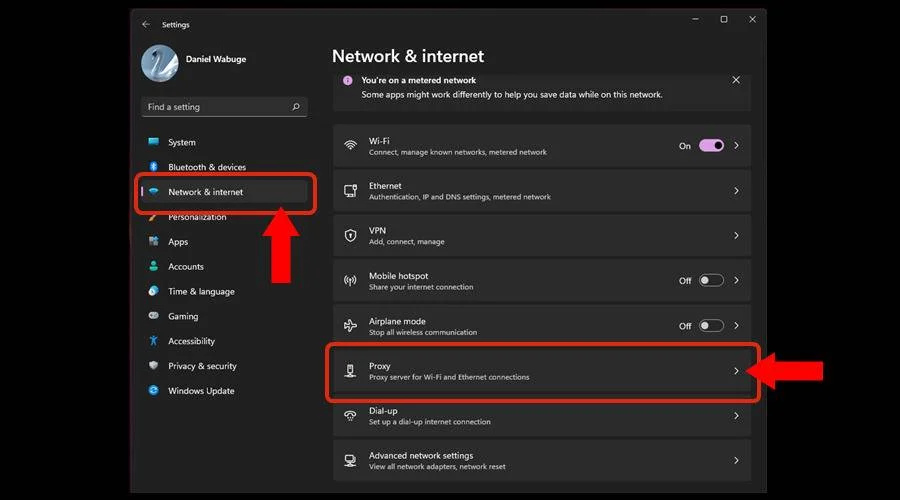
2. Check your account for the Proxy IP Address and Port.
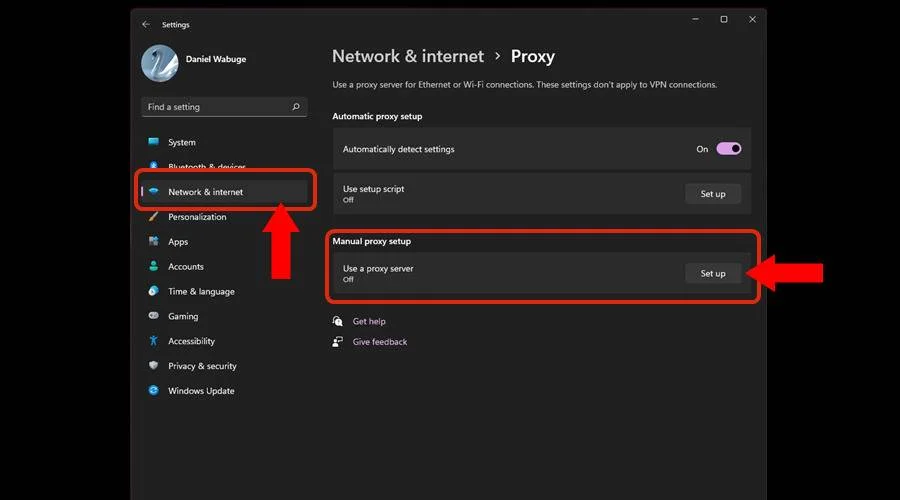
3. Go to your device and look for the Proxy settings under Network configuration.
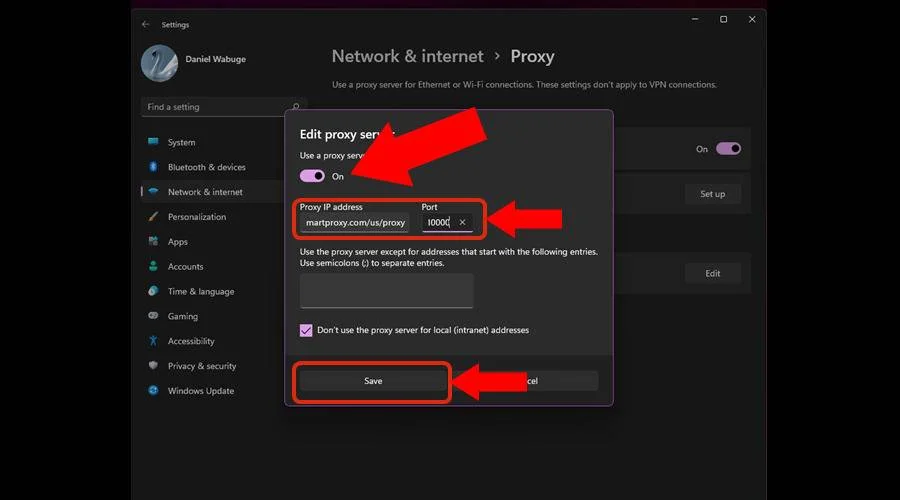
4. Insert the credentials obtained in Step 2 and Save.
5. Now you’ve unlocked the internet in China.
We recommend Smartproxy because it offers flexible pricing. Pay-as-you-go (PAYG) is ideal for a short stay in China. But go for monthly subscriptions if you plan on staying longer.

Smartproxy
Easily bypass restrictions and censorship with this secure proxy service.DNS tunneling
Another way to bypass the GFW is via a DNS tunneling tool.
It redirects traffic through an intermediary server that encrypts DNS queries and responses. This process hides the actual content you’re accessing, making it difficult to detect.
The technique works perfectly against the Wall’s deep packet inspections. As such, you’ll enjoy unlocking websites that China blocks.
There are many DNS tunneling tools on the market. But GreenTunnel is more user-friendly than the competition.
Here’s how to get it up and running:
- Download the GreenTunnel app and install it on your computer.

2. Toggle it ON to activate it.
3. Open your browser and connect to your website of choice.
Sadly, this method may not hide your IP address. This will subject you to possible snooping by China’s authorities.
Note that most DNS tunneling tools come from unverified publishers. As such, this may expose your device to spying by third parties.
Mobile data roaming
Roaming enables mobile users to access local mobile services when traveling abroad. These include but are not limited to calls, SMS, and data.
One advantage of this service is it creates a private tunnel for communications. Accordingly, you’ll be able to access content in your country seamlessly.
It works as follows:
During browsing, the local telco in China reroutes requests to your home provider. This step bypasses the GFW enabling you to access any web resource.
On the downside, data roaming services are expensive. Still, it’s ideal for brief visits to the country.
However, you might be wondering.
Why it’s not a good idea to bypass the GFW with a VPN?
A VPN may enable you to enjoy your internet freedom in China. But it’s not a great idea to use it.
Allow us to explain:
Using a VPN to access blocked content in China is illegal. And ignoring this regulation can land you in trouble.
As mentioned earlier, the Chinese government sanctions anyone breaking the censorship laws. You risk fines, jail time, and even total blocks from using the web.
Here’s the crazy part:
In 2017, China enforced a law that compels VPN providers to seek licensing. However, the regulation requires authorized providers to grant the Chinese government access to user data.
The move saw VPN vendors exit the country in doves. Still, some remain today and abide by the Chinese laws.
This creates a problem of not knowing which providers serve China’s interests. Therefore, you may end up using a VPN service that’s a sell-out.
Another thing:
Most VPNs lack mechanisms to evade deep packet inspection. So, you’ll expose yourself to the authorities by using one.
Not to forget, you’ll need to pay a premium to access virtual private network services. It will translate to double the pain if caught evading censorship.
However, our recommended workarounds work equally well or better than a VPN. Additionally, a good number of them are free.
If you’re into privacy, Tor and Psiphon should be your pick. The two are easy to use, reasonably fast, and available for all devices.
Smartproxy isn’t left far behind. You can take advantage of its vast IP pool to scrape the web.
DNS tunneling will anonymize your traffic. It’s good at bypassing web filters and accessing geo-blocked sites online.
Not to forget, mobile data roaming comes in handy for short visits to China. Besides that, it doesn’t require any installations and troublesome configurations like a VPN.
Summary
There’s no doubt that China’s Firewall suppresses the freedoms of internet users. While a VPN can bypass censorship, it’s not the safer option.
There are obvious risks of brushing shoulders with the Chinese authorities. And the punitive penalties are not worth your peace of mind.
Luckily, you now know various ways to bypass the China Firewall without a VPN. All the methods are safe, privacy-first, and adequately fast.







User forum
0 messages